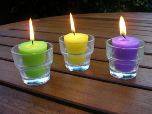Monday April 18, 2011

Berit Myrekrok / Getty Images
Today's Mailbag Monday comes from "Joe". (Yes, he/she just posted as "Joe".) "Joe" posted a User-Answer to my question, Which Candle Wax is Better? Soy or Paraffin?
I have a number of questions on the site that readers can answer. Many have generated lively discussion...and this question has been no exception! But rather than just add "Joe's" to the collected answers, I wanted to feature it here and dispel some of the myths that "Joe" is perpetuating.
Joe's (unedited by me) answer to "Which Wax is Better?" was, "parrafin wax is like burning diesel fuel in your house. soy is cleaner and doesnt soot. also be sure to check what your wick is made from cheaper candles use lead."
My answer, or rather correction, to Joe's post is here...
For more information about Mailbag Monday - or to send me a question - visit All About Mailbag Monday.
Check out previous questions I've answered in the Mailbag Monday Archive.
Saturday April 16, 2011
 I know there are people in the U.S. and in the Northern hemisphere who are just now coming out of snow and winter...but if you're in the South like me...or in the Southern hemisphere, things are plenty warm...which means it's time for mosquitoes. Many of you like the Citronella Bucket Candles, or the dramatic, primitive, Citronella Torch Candles. But what do you do if you want a more intimate setting...or are using the candles in a smaller space? Citronella votives! Cute and functional at the same time. They're really not much different than making a regular votive candle. The key is to substitute your normal favorite fragrance oil for a Mosquito Repelling Essential Oil Blend.
I know there are people in the U.S. and in the Northern hemisphere who are just now coming out of snow and winter...but if you're in the South like me...or in the Southern hemisphere, things are plenty warm...which means it's time for mosquitoes. Many of you like the Citronella Bucket Candles, or the dramatic, primitive, Citronella Torch Candles. But what do you do if you want a more intimate setting...or are using the candles in a smaller space? Citronella votives! Cute and functional at the same time. They're really not much different than making a regular votive candle. The key is to substitute your normal favorite fragrance oil for a Mosquito Repelling Essential Oil Blend.
.
Thursday April 14, 2011

(L to R) Deborah May, HSMG President Leigh O'Donnell, Congressman Brad Sherman (CA), Feleciai Favroth, Marie Gale
Leaders from the Handcrafted Soap Makers Guild (HSMG) have been continuing their efforts to work with Members of Congress to educate them out our industry and how the evolving Safe Cosmetics Act in the 112th Congress would affect it. Members of the HSMG recently received this update:
After hearing the concerns of the HSMG in February and the promise to continue a dialogue with them on behalf of the HSMG, staff members of Congresswoman Jan Schakowsky have been quite responsive in keeping us informed. In our most recent communication, we learned that a number of the provisions of the original bill are being redrafted. We are not surprised by this information based on the range of issues discussed in our February meeting.
Although we have not seen any of the new draft language, through our continued engagement with offices involved in drafting the bill, we are optimistic that we will get to see and comment on any proposed language that directly impacts HSMG and the industry. Furthermore, we remain encouraged that our ongoing conversations with Congresswoman Schakowsky, her staff and our continuing outreach with other Members of Congress will result in more positive conversations and support for HSMG concerns as the legislative proposal is developed and finalized.
Here's more information about the Safe Cosmetics Act.
Monday April 11, 2011

Circa 1550, Alchemists using fire in the distillation process.
Original Artist: Stradamus - Hulton Archive / Getty Images
Jonathan from Findlay, OH writes, "I love using aromatic plants in my cooking and (as essential oils) in my soap. I can understand how orange peel or mint or rosemary (really strong smelling plants) can have lots of essential oil, but how do you get essential oils from flowers, more delicate plants or things like cedarwood or cinnamon?"
Jonathon, you've asked about one of my favorite subjects...essential oils. Essential oils are amazing compounds - one of the true wonders of nature. They are the "essence" of the plant - what makes it special. The oils are stored in the cells of the plants - sometimes in the leaves or needles (like in mint or pine), in the flowers (like rose or chamomile), bark (like birch or cinnamon), roots (like ginger or spikenard), in the skin or rind (like in citrus fruits) or in the seeds (like cardamom or anise). They've been used for thousands of years - and while it may take hundreds or thousands of pounds of plant material to yield just one pound of essential oil, the process is actually pretty simple. Here's more about how essential oils are extracted from plants and more about water and steam distillation of essential oils.
For more information about Mailbag Monday - or to send me a question - visit All About Mailbag Monday.
Check out previous questions I've answered in the Mailbag Monday Archive.






